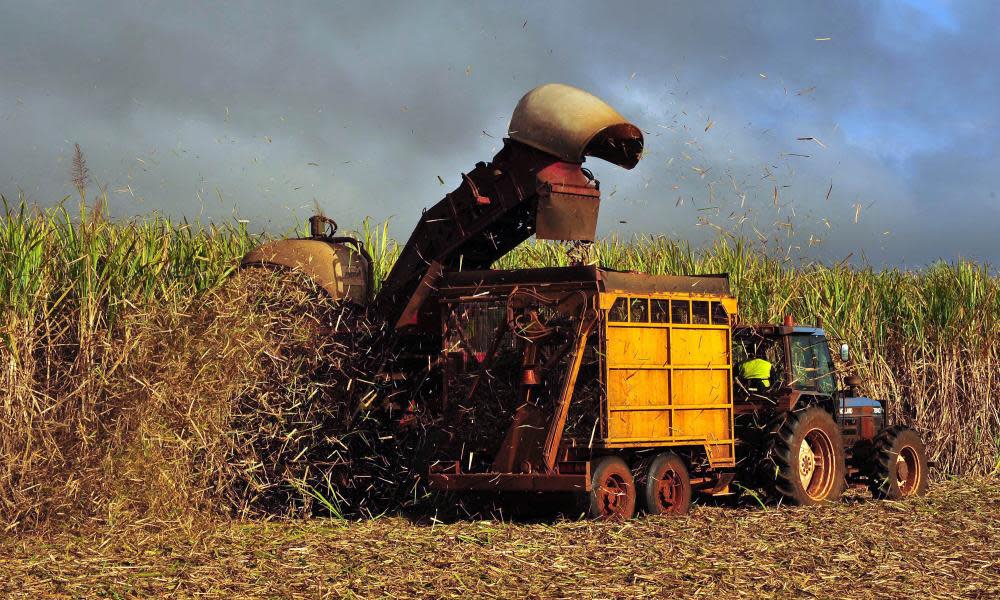Canegrowers given reef foundation grant while campaigning against pollution regulation

The peak sugar cane industry group, Canegrowers, is using a $1.4m grant from the Great Barrier Reef Foundation to “set the record straight” about its environmental practices, while campaigning against Queensland government proposals for new pollution regulations.
The organisation’s public funding – for measures to reduce pollution flowing to the Great Barrier Reef – has been called into question after the group began promoting lectures by the controversial academic Peter Ridd, who argues farm run-off is not damaging the reef.
Related: State government-funded managers urge cane farmers to question reef science
The overwhelming scientific consensus, supported by governments and the foundation, is that water quality is one of the most significant threats to the health of the natural wonder.
In April, the foundation awarded $1.4m to Canegrowers – one of the first grants issued under its $443m partnership with the federal government – to continue a program managed by external behavioural consultants called Cane Changer.
Cane Changer is partly designed “to improve recognition” of growers “for their long history of environmental stewardship” and the organisation has said the program will “set the record straight”. It also works with farmers to promote voluntary “best management practice” measures.
The Greens senator Peter Whish-Wilson has this week written to the foundation to question the award of the grant.
Sign up to receive the top stories from Guardian Australia every morning
“How is it that the foundation has given a grant to improve water run-off to an organisation that is now involved in a speaking tour questioning whether run-off matters?” Whish-Wilson asked.
“I am writing to ask you what steps the foundation takes to ensure that the recipients of grants are not supporting or involved in activities that aim to discredit the scientific community or promote the denial of anthropogenic climate change.
“Has or will the foundation terminate this grant and take steps to recover funds already granted?
“It is paramount that the foundation do everything it can, and be seen to be doing everything it can, to support the scientific community and defend the evidence regarding the impact of climate change and agricultural run-off on the reef.”
The foundation’s managing director, Anna Marsden, said it funded “organisations that contribute to … collective efforts to save the reef.
“Funds have been provided to Canegrowers to support on-ground work with cane farmers to encourage positive change and stewardship, with the goal of improving land management practices and ultimately reducing pollutants going to the reef,” Marsden said.
Related: Sugarcane farmers label scientific consensus on reef 'unsubstantiated scaremongering'
“The grant continues a successful project previously funded by the Queensland government.
“The use of funds by Canegrowers is closely accounted for, with all funding required to be used solely for the ultimate purpose of improving the water quality of the reef.”
Canegrowers says its statewide organisation manages state and federal grant funding and “remains committed to managing the impact of farming on the waterways that feed into the Great Barrier Reef”. It says district branch companies have made individual decisions about promoting or supporting Ridd’s controversial lectures.
The speaking tour coincides with a likely vote in Queensland parliament this month on reef regulations, which would set pollution limits for sediment and chemical discharge from farms into the reef catchment.
“Canegrowers is very concerned that the provisions within the reef bill currently before the Queensland parliament will act as a disincentive to growers continuing with the excellent engagement they have given to water quality and farm practice improvement programs by implying that no matter what they do, it will never be enough and the goalposts will keep on shifting,” the organisation said in a statement.
“The campaign against the reef bill is against the ramping up of the existing regulations on cane farming, adding more bureaucracy with no clear benefit to growers or water quality.”
The state environment minister, Leeanne Enoch, defended the measures this week and said they were based on scientific advice.
“For the last decade, the Queensland government has supported agricultural industries to voluntarily improve their practices. However, uptake has not been fast enough, so water quality has continued to decline.”

 Yahoo News
Yahoo News 
